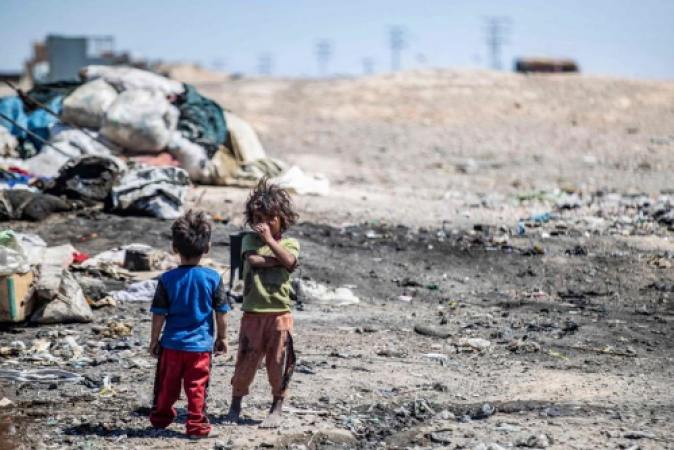
Raqqa: The northeast of Syria, which is controlled by the Kurds, is home to thousands of war refugees who are trapped in filthy, unofficial camps, suffering from extreme poverty, and are largely cut off from outside aid.
Rahma Al-Hammud, 33, stood in front of her tent, which was made of a hastily put together patchwork of old fertiliser bags, tarps, and worn-out fabric. "We've been completely forgotten," she said.
"Our kids keep getting sick, over and over. The widowed mother of four claimed that they experience fever, diarrhoea, and vomiting.
Also Read: Pakistan's Bold Move: Urges Iran to Rethink Commitments in Massive Gas Pipeline Venture
She resides in the Al-Yunani camp in the northern province of Raqqa, which served as the de facto capital of the Daesh organisation until it was overthrown by US-backed Kurdish-led fighters in 2017.
It is one of many unofficial camps inside Syria for people displaced by the conflict, and it is situated close to the Euphrates River.
While kids in filthy clothes and bare feet play in the dirt, women can be seen carrying heavy buckets of water from communal tanks in temperatures that can reach 40 degrees Celsius (104 degrees Fahrenheit).
In the north and northeast of Syria, there are dozens of unofficial camps housing tens of thousands of people, according to Sheikhmous Ahmed, a representative of the semi-autonomous Kurdish administration.
He claimed that only 16 camps, totaling about 150,000 residents, are officially acknowledged and have access to international aid, including Al-Hol and Roj, which are thought to house IS fighters' kin.
Also Read: Pakistan's Bold Move: Urges Iran to Rethink Commitments in Massive Gas Pipeline Venture
Even in official displacement camps, living and hygiene conditions can be appalling, but in informal settlements, where there is no sign of organisation and little to no humanitarian aid, things can occasionally be even worse.
These unofficial camps, according to Tanya Evans of the International Rescue Committee, "can be considered the forgotten camps" of Syria.
In a statement to AFP, she said that in order to guarantee that such camps "receive the assistance they desperately need, increased attention, funding, and sustained efforts by the international community are crucial."
Hammud, a resident of another area of Raqqa province who has been uprooted, claimed that aid was "scarce" and that international organisations "do not recognise" the Al-Yunani camp.
A day labourer in the agricultural industry named Hammud said, "Even if they helped us every two or three months, people would have" better lives.
To supplement their income, three of her children also work in a nearby industrial area.
Since the regime's suppression of peaceful protests in 2011, more than 500,000 people have died in Syria's war, which has also caused millions of people to flee their homes.
It turned into a bloody conflict that drew in foreign powers and jihadists from around the world.
Sheikhmous Ahmed claims that in an effort to improve living conditions, Kurdish authorities are "working on a plan to transfer residents from informal to formal camps."
If this were to happen, it might make life better for those who live in Sahlat Al-Banat, a temporary settlement outside of Raqqa that is situated next to a landfill. Residents spend their days searching the garbage dump for valuable items they can sell, such as scrap metal and pieces of plastic. Their primary source of income is from it.
Shakura Mohammed, a 30-year-old mother who was displaced from the nearby Deir Ezzor province, said, "The situation in the camp is tragic." People look through the trash for items they can sell in order to pay for bread and support themselves, she claimed. "No aid comes to the camp," she continued.
79 percent of settlements in the province of Raqqa are reportedly unofficial, according to a report by the UN agency for humanitarian affairs OCHA.
Also Read: Three Police Officers Detained Amidst Riots and Unrest
Early in 2020, under pressure from Russia, a regime ally at the UN Security Council, a UN cross-border mechanism that allowed aid to enter northeast Syria from neighbouring Iraq was shut down, making things worse for those in need.
Sahlat Al-Banat resident Umm Rakan claimed she had given up hope that things would get better.
"We no longer rely on anyone's assistance. The woman in her 40s, who was also displaced from Deir Ezzor, said, "We lost hope years ago.
We will be stuck in this hell for all of time, according to destiny.